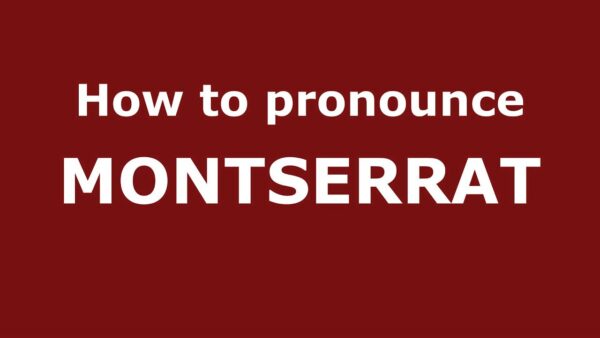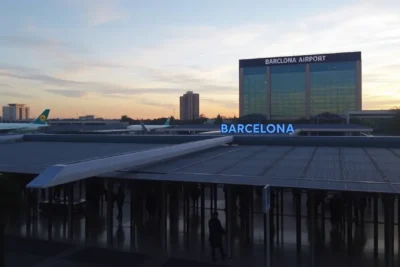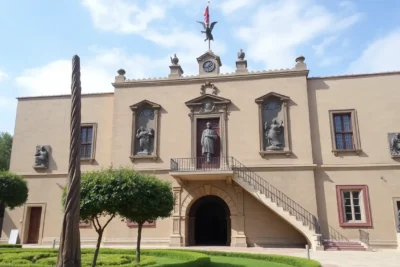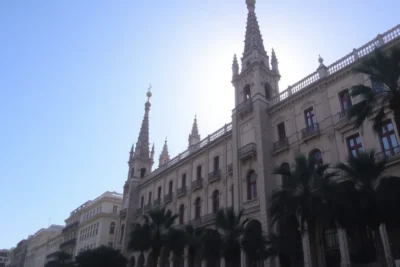
- How to Pronounce Montserrat: A Comprehensive Guide
- Common Mispronunciations of Montserrat and How to Avoid Them
- The Origins of the Name Montserrat and Its Pronunciation
- Phonetic Breakdown: How to Say Montserrat Correctly
- Cultural Significance of Montserrat and Its Proper Pronunciation
- Tips for Mastering the Pronunciation of Montserrat
Montserrat is a name that can refer to various places and even a popular typeface, but one question often arises: **How do you pronounce Montserrat?** Understanding the correct pronunciation is essential, especially for travelers and those discussing the beautiful Caribbean island or the iconic mountain near Barcelona.
The pronunciation can vary based on geographical and cultural contexts, making it an interesting topic of exploration. Whether you're planning a visit or simply want to enhance your linguistic skills, mastering the pronunciation of Montserrat can add a touch of authenticity to your conversations.
How to Pronounce Montserrat: A Comprehensive Guide
To effectively pronounce Montserrat, it's crucial to break it down phonetically. The name is typically pronounced as mon-seh-rat in English, with an emphasis on the second syllable. In the context of its origin, particularly in Spanish, it may sound more like mon-tsa-rat. Familiarizing yourself with these variations will enhance your ability to communicate correctly.
When practicing the pronunciation, consider the following tips to ensure clarity and accuracy:
- Listen to native speakers or pronunciation guides online.
- Repeat the word several times, focusing on each syllable.
- Record yourself to compare your pronunciation with that of native speakers.
It’s interesting to note that Montserrat can refer to several locations, including the Caribbean island and the mountain in Catalonia, Spain. Understanding the context can also help determine how you might choose to pronounce it in conversations. If you encounter the name in different settings, keep these regional accents in mind:
| Context | Pronunciation |
|---|---|
| Caribbean Island | mon-seh-rat |
| Catalonia, Spain | mon-tsa-rat |
Mastering the pronunciation of Montserrat not only aids in travel but also enriches your discussions about cultural landmarks. As you practice, remember that confidence in your pronunciation will enhance your interactions and appreciation of the places associated with this name.
Common Mispronunciations of Montserrat and How to Avoid Them
Despite its straightforward phonetics, the name Montserrat is often mispronounced in various forms. Some common mispronunciations include “monserrat”, where the second syllable is incorrectly blended, and “montserat”, which skips the correct vowel sound. These variations can lead to confusion, especially in conversations about travel or geography. To avoid these pitfalls, it’s essential to break down the pronunciation clearly and pay attention to the syllable emphasis.
One effective way to ensure the correct pronunciation is by familiarizing yourself with the most common mistakes. Here are a few mispronunciations to watch out for:
- Mon-serrat – omitting the 't' sound in the second syllable.
- Mont-seh-RAT – stressing the last syllable instead of the second.
- Mon-sarrat – failing to include the clear separation between syllables.
To enhance your pronunciation skills, consider using interactive language learning apps or social media platforms where native speakers share their knowledge. Listening to how individuals from different regions pronounce Montserrat can also provide valuable insights into the correct articulation. Engaging in conversation with those familiar with the name will build your confidence and accuracy in pronunciation.
Ultimately, being aware of common mispronunciations and actively practicing the correct pronunciation of Montserrat will not only improve your communication but also deepen your appreciation for the cultural significance associated with this name. By incorporating these strategies, you’ll navigate discussions about Montserrat with ease and authenticity.
The Origins of the Name Montserrat and Its Pronunciation
The name Montserrat has its roots in the Latin term "mons serratus," which means "serrated mountain." This name is particularly relevant to the iconic mountain located near Barcelona, Spain, known for its unique jagged appearance. Additionally, the name Montserrat is associated with the Caribbean island as well, highlighting its cultural significance in both Spanish and English-speaking contexts.
When discussing the pronunciation of Montserrat, it's essential to recognize the influence of the name's origins. In Spanish, it is pronounced as mon-tsa-rat, with a distinct emphasis on the second syllable. In contrast, English speakers often pronounce it as mon-seh-rat. The difference in pronunciation reflects regional accents and cultural interpretations.
To further understand how to pronounce Montserrat correctly, consider these key points:
- The name has a clear phonetic structure that can be broken down into three syllables.
- Emphasis is crucial; in both Spanish and English, the second syllable carries the stress.
- Listening to native speakers' pronunciations can provide valuable insights.
In addition to its geographical implications, the name Montserrat also appears in various cultural references, including music and literature. Familiarity with its pronunciation and origins can enrich discussions about the places and their associated histories. As you engage in conversations about Montserrat, keep in mind the contextual pronunciation variations to ensure clarity and respect for the name's heritage.
Phonetic Breakdown: How to Say Montserrat Correctly
To master the pronunciation of Montserrat, it is helpful to focus on the phonetic breakdown of the word. The name consists of three syllables: mon, se, and rat. In English, it is typically pronounced as mon-seh-rat, while in Spanish, the pronunciation shifts slightly to mon-tsa-rat. This distinction highlights the importance of understanding the cultural context when discussing Montserrat.
When breaking down the syllables, remember that the stress falls on the second syllable in both languages. This consistent emphasis is key for clarity. To reinforce your understanding, try practicing with these phonetic cues:
- Identify the vowel sounds in each syllable.
- Pay attention to the transition between syllables.
- Utilize audio resources that provide examples of both pronunciations.
Additionally, recognizing the common mistakes associated with the name can further improve your pronunciation skills. Many people mispronounce it by blending syllables or misplacing the stress. To avoid such errors, keep these variations in mind:
- Mon-serrat – incorrectly omitting the 't'
- Mont-seh-RAT – stressing the final syllable
- Mon-sarrat – failing to articulate the distinct syllables
Engaging in conversation or listening to native speakers will significantly enhance your confidence. By familiarizing yourself with the correct pronunciation of Montserrat, you not only improve your communication skills but also deepen your appreciation of its cultural significance. The journey to mastering this name is a rewarding way to connect with the rich histories of the regions it represents.
Cultural Significance of Montserrat and Its Proper Pronunciation
The cultural significance of Montserrat extends beyond its geographical locations, encompassing rich histories and traditions. The Caribbean island of Montserrat is known for its vibrant Irish heritage, stemming from the 17th-century Irish Catholic immigrants. These cultural influences are reflected in the island’s festivals, music, and cuisine, making it a unique destination where cultural intersections thrive. Meanwhile, the Montserrat mountain in Spain is home to the famous Montserrat Monastery, a site of pilgrimage that attracts thousands of visitors seeking spiritual enlightenment and breathtaking views.
Understanding the proper pronunciation of Montserrat is essential for appreciating its cultural significance. The name, pronounced as mon-seh-rat in English and mon-tsa-rat in Spanish, encapsulates the identity of both the island and the mountain. By mastering these variations, you not only enrich your vocabulary but also show respect for the cultural nuances associated with the name. This awareness fosters deeper connections during conversations about travel, history, and cultural heritage.
Additionally, the pronunciation of Montserrat reflects its linguistic roots, as the name translates to "serrated mountain" in Latin. This connection to nature and geography enhances the cultural appreciation for the Montserrat mountain in Spain, known for its distinctive rock formations. Both locations carry stories that resonate with their respective communities, making the correct articulation of Montserrat an important aspect of engaging in cultural discussions about these sites.
In summary, the proper pronunciation of Montserrat serves as a gateway to understanding its rich cultural tapestry. By recognizing its significance in both Caribbean and Spanish contexts, individuals can engage more authentically in conversations about these remarkable places. Whether discussing the island's festivals or the monastery's spiritual significance, knowing how to pronounce Montserrat correctly highlights the importance of cultural respect and appreciation.
Tips for Mastering the Pronunciation of Montserrat
To effectively master the pronunciation of Montserrat, one of the best strategies is to break the name down into its component syllables. Focus on practicing the sounds of each syllable individually: mon, se, and rat. This phonetic dissection will help you understand the rhythm of the word and make it easier to pronounce accurately during conversations.
Another useful tip is to utilize online resources such as pronunciation videos and audio guides. Engaging with multimedia content can enhance your learning experience. Consider these methods to improve your skills:
- Watch videos featuring native speakers pronouncing Montserrat.
- Follow along with interactive pronunciation apps.
- Practice speaking along with audio examples to train your ear and mouth.
Consistent practice is crucial for mastering the pronunciation of Montserrat. Repeatedly saying the name aloud, preferably in various contexts, will reinforce your learning. You may also want to record yourself and listen for differences between your pronunciation and that of native speakers. Here are a few effective practices:
- Set aside dedicated time for pronunciation practice each day.
- Join language exchange groups to converse with native speakers.
- Incorporate the name Montserrat in your daily conversations to build familiarity.
Finally, understanding the regional variations can aid your pronunciation skills. Being aware of the slight differences between English and Spanish pronunciations can enrich your appreciation for the name. By embracing these tips and committing to practice, you will confidently navigate discussions about Montserrat with authenticity.
 How to Pronounce Montserrat: A Quick Guide for Travelers
How to Pronounce Montserrat: A Quick Guide for Travelers How Far is Montserrat Monastery from Barcelona: A Scenic Day Trip
How Far is Montserrat Monastery from Barcelona: A Scenic Day Trip Conquering the Heights: How Challenging is the Montserrat Hike?
Conquering the Heights: How Challenging is the Montserrat Hike? Unveiling the Mystery: Can You Actually Touch the Black Madonna at Montserrat?
Unveiling the Mystery: Can You Actually Touch the Black Madonna at Montserrat?If you want to know other articles similar to How do you pronounce Montserrat? you can visit the category WHERE YOU CAN GO.
Deja una respuesta










Read more!